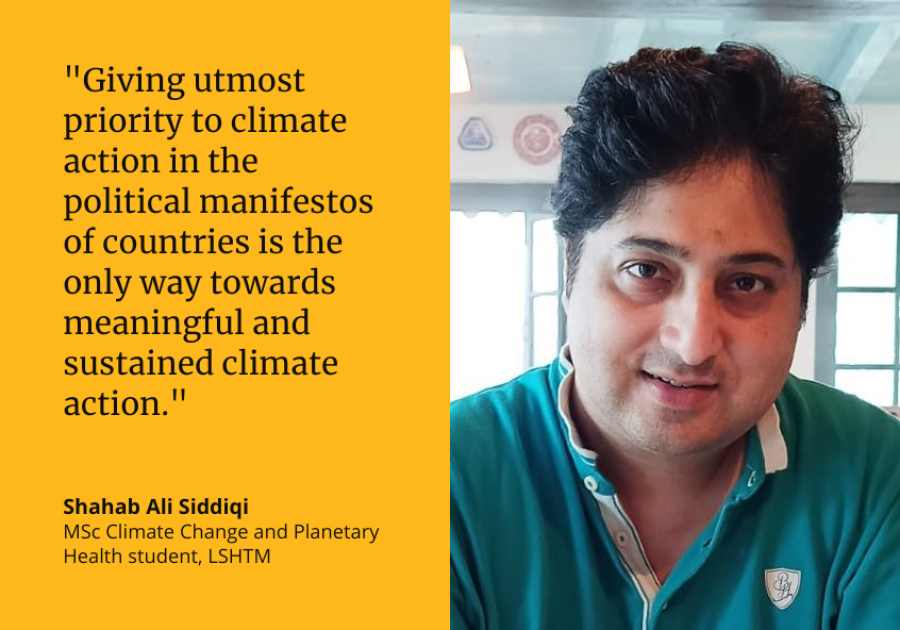Expert Comment – Health Day at COP28
6 December 2023 London School of Hygiene & Tropical Medicine London School of Hygiene & Tropical Medicine https://lshtm.ac.uk/themes/custom/lshtm/images/lshtm-logo-black.png
With climate and health on the agenda at COP28, students and representatives of the new MSc in Climate Change and Planetary Health course at the London School of Hygiene & Tropical Medicine (LSHTM) have been following discussions with interest.
The first-ever Health Day took place on Sunday, focused on how climate change is impacting human health and what can be done about it. Delegates, including LSHTM experts, gathered in Dubai for various sessions and events while many others including students and members of the Centre on Climate Change and Planetary Health at LSHTM watched online.
Shahab Ali Siddiqi is a public health practitioner who has worked as a health systems expert with organisations including the Asian Development Bank, Save the Children and the Government of India. He started his studies at LSHTM this term as one of the first cohort of students on the MSc in Climate Change and Planetary Health.
He said: “Having a health day at COP is a welcome step and an acknowledgment of the centrality of health of the people in the climate change discourse. The focus which it brings on the health impact of climate will not only accelerate the health system response but also inculcate climate consciousness in societies.”
One of the COP28 discussions he tuned in to was the Earth Information Day event, held on Health Day. This highlighted the fact that 2023 is on track to be the warmest year on record, as well as the importance of global data.
Shahab said: “A key takeaway for me was that giving utmost priority to climate action in the political manifestos of countries is the only way towards meaningful and sustained climate action.
“Supporting countries in creating standardised climate data systems and reducing information inequities is an essential step.
“Innovative funding facilities like the Systematic Observations Financing Facility brings great hope for ushering and accelerating climate action in resource constrained regions.”
Andrea Hull, another student on the MSc in Climate Change and Planetary Health, said: “I am thrilled to see that over 120 countries have signed on to the Climate and Health Declaration, and that the health co-benefits of equitable climate action are being recognised. Health needs to be centred in these discussions because the climate crisis is affecting the wellbeing of people around the world today.
“Citizens around the globe are looking for leaders to take courageous and bold action to equitably transform our energy and food systems, while re-imagining new economic systems that value the wellbeing of humans and the environment, not profits. I hope for bolder action toward a fossil fuel non-proliferation treaty, and binding commitments to end fossil fuel subsidies.
“Planetary Health offers a framework to re-connect humans with the ecosystems and planetary systems that allow us to thrive, and we have so much to learn from Indigenous Knowledge Systems. I hope to see these voices prioritised.”
Pauline Paterson, LSHTM Associate Professor and Co-Programme Director of the MSc in Climate Change and Planetary Health, said: “I was particularly pleased to see the addition of a Health Day at COP. Putting health at the centre stage this year will help build awareness of the disastrous health impacts of climate change.
“I hope it also highlights the incredible health co-benefits that climate action can bring, such as reduced respiratory disease and improved physical and mental health. We need to drastically reduce our carbon emissions through a combination of governmental and systemic transformations as well as individual behaviour-led changes. Bringing these health co-benefits into reality requires well-designed and equitable policies that make it as easy as possible for all sections of society to shift to lower-impact lifestyles.”
Dr Paterson welcomed commitments made at COP28 to plant-based catering, as well as broader promises around sustainable agriculture, and the announcement on Health Day that 10 government agencies have pledged to provide training for officials to develop climate-related skills.
She said: “This is great – officials, managers and leaders need to increase knowledge and awareness of climate change, its health impacts and how to act quickly and efficiently to solve the climate crisis.
“I am delighted that students on our new MSc are already getting ahead by expanding their knowledge in key areas such as how global environmental systems such as heat stress, food systems, air pollution, and biodiversity loss affect human health, and how to address the challenges posed and move from research to action – co-designing and planning evidence generation for planetary health policies and practices.”
LSHTM's short courses provide opportunities to study specialised topics across a broad range of public and global health fields. From AMR to vaccines, travel medicine to clinical trials, and modelling to malaria, refresh your skills and join one of our short courses today.